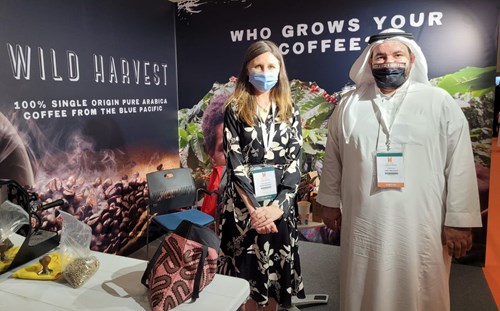Upon first glance, it may be difficult to identify the myriad similarities between the Blue Pacific and the Middle East regions. Where one moves on ‘island time’, surrounded by rainforest, plentiful ocean and rich soil, the other moves quickly, with desert cities scattered across an often hot and arid expanse of land. Although thousands of kilometers apart, these distinct regions have histories deeply rooted in neighborhood trading. As Pacific forebears paddled to nearby islands to trade goods, the Arab people traversed the desert on camels to do the same. It is this shared history of trade that in modern times, seeks to align the two vastly diverse regions.
With much of the Middle East rich in oil and containing over 48 per cent of the world’s known oil reserves [1], this historically plentiful resource has significantly contributed to the economic growth and prosperity of the region. However according to the World Economic Forum, the Middle East is now shifting to a sustainable future with governments in the region expediting investments in renewables and exploring new trade options that look to the future.
Pacific Trade Invest (PTI) Europe’s Trade Commissioner, Jodie Stewart, recently visited the Middle East to foster relationships for Blue Pacific businesses. Speaking on her experience, Stewart says “the Middle East is fast becoming one of the world's great business destinations and offers much promise for businesses across the Pacific interested in global opportunities. I am excited to see what this brings for our Pacific Islands businesses.”
Stewart highlights that the region should not be considered homogeneously, as the Middle East is made up of many countries with varying histories, cultures, trades, and current priorities. While some countries in the region continue to experience severe political turmoil, others, such as Qatar, Kuwait, and United Arab Emirates (UAE), are economically flourishing.
Due to its longstanding position as a trade hub, Dubai has always had an unmistakable air of internationalism. Right now, Dubai is hosting the 2020 World Expo, from 1 October 2021 to 31 March 2022, which links innovation, technology, art, and culture to offer a great experience. This is allowing Dubai to really bring countries together to showcase the best of what they have to offer.
“At the World Expo, the Pacific Island countries are well represented, with highly impressive and impactful pavilions. The climate message they are delivering is so clear and one that inspires individual action. Upon my visit, I found my heart swelling with pride at how visitors to the Pacific Islands pavilions were moved by their encounters.”
As the capital and most populous city of the UAE, Dubai is testament to the well-established infrastructure of the country itself, one with both a strong banking system and stable political position. Stewart says that within this flourishing market, there is opportunity for Pacific exporters.
“In Dubai, grocery shopping is an experience to behold. It is impossible to not be struck by the giddying amount of product on offer in their grocery stores. There is a bright display of packaging, colour, lighting, signs, that draw attention, and staff available to assist no matter the hour of day. The grocery stores emit a message of ‘there’s nothing you can’t buy’. For foreign exporters, this spells opportunity.
“I am encouraging Pacific businesses to tap into this growing market, noting the special considerations required. Within the region, the Gulf Standardization Organization sets the framework for the UAE’s packaging and labelling requirements. As is always the case when exporting abroad, a Certificate of Origin is needed for all exports to clear customs. Cultural norms and values should also be factored in when designing and developing product packaging. In the UAE, for example, religious aspects mean that any products containing meat, no matter how little, must have halal certification. Ingredients must also be labelled in Arabic.”
“The Emiratis, as a people, strike me as outward looking. They seem to have a spirit of great fun about them and are optimistic about the future of their country and want to make new business acquaintances.”
“While far from being an expert on this region, I am happy to extend any level of assistance I can to businesses that might be interested in doing business in the Middle East. I encourage Pacific businesses to reach out to PTI Europe after having completed a competitor analysis of the category your product or range sits in. This analysis can be easily done by looking at the websites of the major supermarket chains in the region: Carrefour, Al Maya, Choithrams and Lulus. Interested businesses will need to identify potential advantages, such as better quality, lower prices or product uniqueness against competitor ranges to enable our team to identify buyers and pitch your products”
If you have questions about entering the Middle Eastern or European market, you can email PTI Europe Trade Commissioner, Jodie Stewart, on Jodie.Stewart@pacifictradeinvest.com
[1] https://www.geoexpro.com/articles/2010/07/why-so-much-oil-in-the-middle-east



